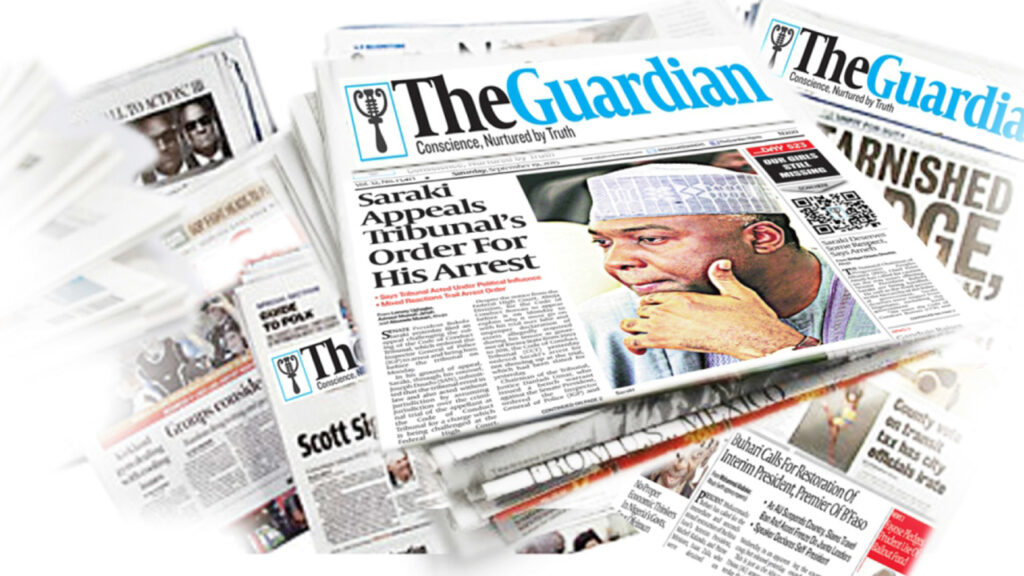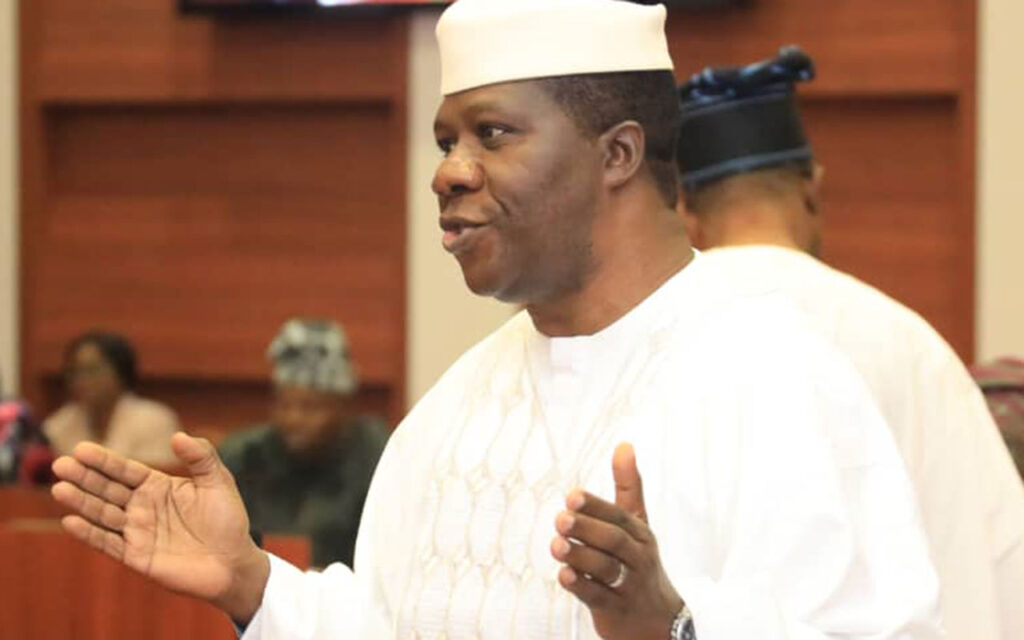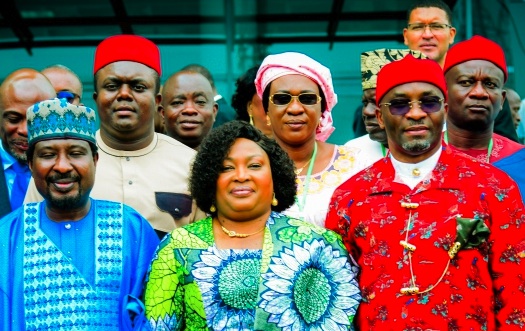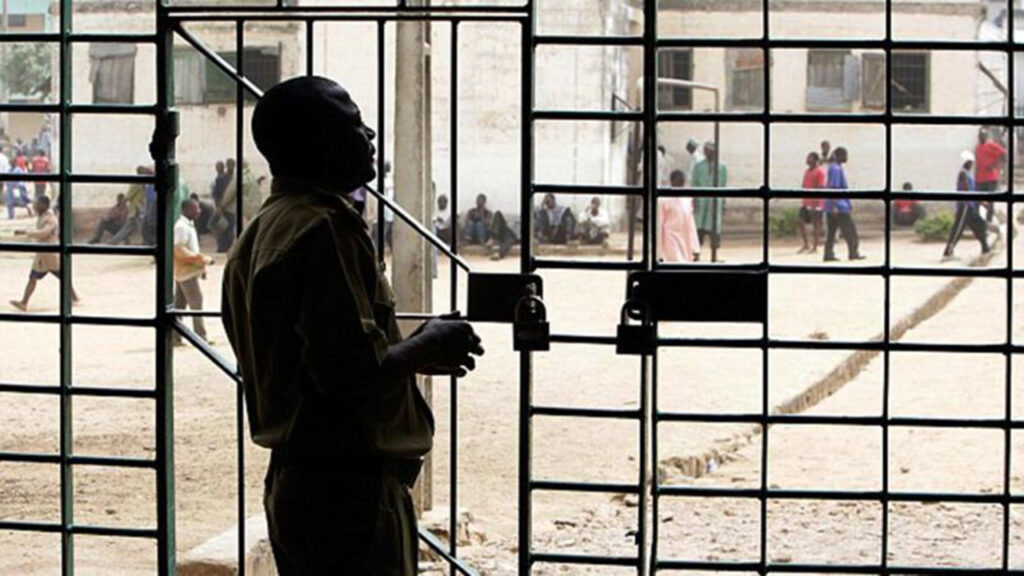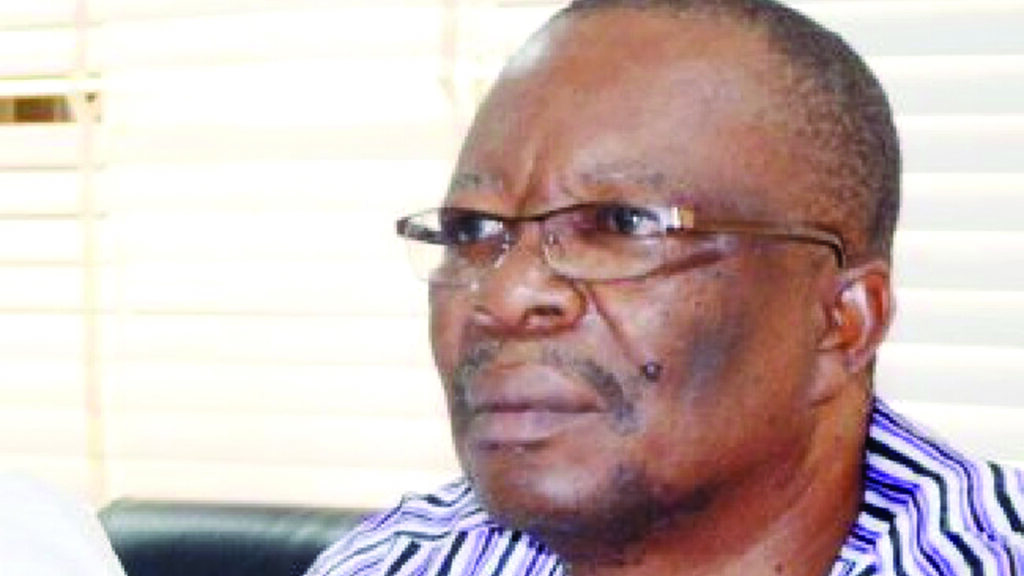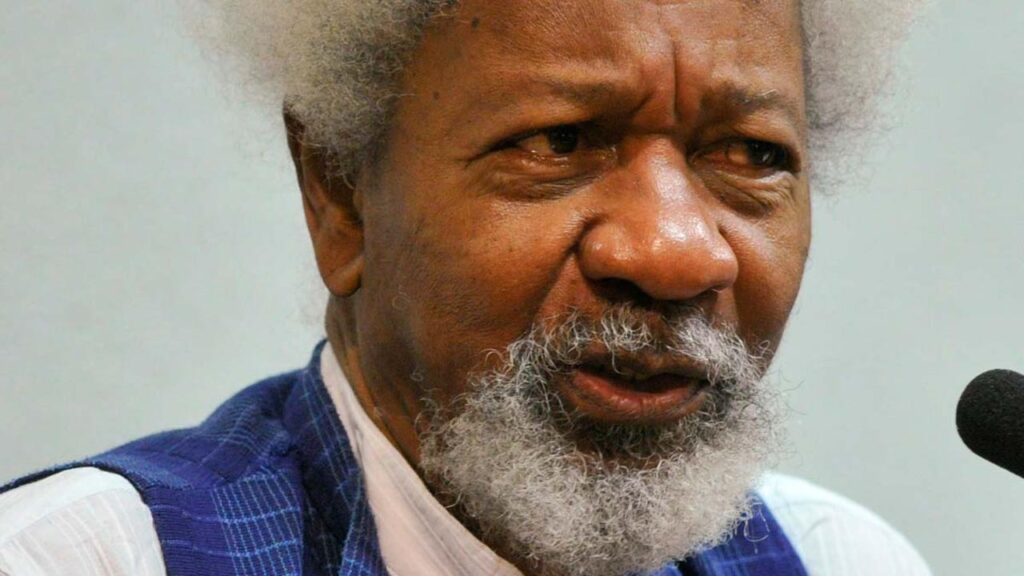
“Opinion writing enjoyed a renaissance that brought in specialisation and elevated it beyond the exclusive headache of the title editor. Even as the concept of the editorial board as we know it today had started at the Daily Times under Dr Dele Cole, The Guardian perfected it, attracting egg heads from our campuses to its editorial board, and enriching the art of informed commentary.”
Idowu recalled how the excellent impact of the newspaper has continued to garner medals from the DAME staples and other reward schemes. “When a deliberate scheme of rewarding professional excellence such as that offered by the Diamond Awards for Media Excellence (DAME) began,The Guardian was one of the early stars, winning the Newspaper of the Decade in 2001 and joint winner of the same prize in 2011 with The Punch,” Idowu said.
However, Idowu identified some gaps in the pursuit of the publication’s cherished values, saying, “the deep research, engaging prose, and informed analyses that characterised its editorial output in the first two decades have declined.”
Insisting however, “the paper is still a respected brand in the market, but it is playing catch-up in a number of areas. It will need to overcome its internal contradictions, refocus, retool, and reinvigorate its workforce with renewed vision for that culture of service delivery that lent some credence to its claim as the flagship of the Nigerian press.”
The journalist attributed the dislocations to “the same problems affecting the Nigerian state of gap between potential and achievement, available resources and their deployment.” Adding that he hopes that the recent reorganisation efforts would lead to greater impact.
Another ex-employee of The Guardian who later joined The Punch and grew through the ranks to become Editor, and later, Deputy Editor-in-Chief of The Punch, Gbemiga Ogunleye said the introduction of The Guardian to the newspaper market through the teaser, “Sooner or later, you will read The Guardian!” worked the magic for the suspense that trailed its arrival on the newsstand on February 27, 1983.
“As a final year and undergraduate student at the university, I waited to read The Guardian, and of course, the publication kept to its words. It was a new and strong voice that changed the standard of journalism in the country. And for a very long time, The Guardian tried to fulfill that mandate. It gave voice to the voiceless and became the conscience of the nation.”
Ogunleye, now a Barrister at Law who has also served as Provost, the Nigerian Institute of Journalism (NIJ), Ogba, Ikeja, Lagos believed that the proscription of the paper on August 14, 1994 by the military government of the late General Sani Abacha had negative effect after its de-proscription in 1995.
“But after Abacha’s proscription of The Guardian, I wouldn’t say the publication returned to that era of its cherished philosophy. But, overall, we must salute the founders of The Guardian, they came at the right time. They changed the face of journalism in this country,” said Ogunleye.
Former Nigeria’s Permanent Delegate and Ambassador to the United Nations Educational, Scientific and Cultural Organisation (UNESCO) and President, 32nd General Conference of UNESCO, Emeritus Professor Michael Omolewa, described The Guardian as an old French wine which gets better each day, month, and year.
“The paper deserves our congratulations for its work for 40 years, and still counting. Its roots at its foundation as an independent newspaper have been noble, attractive, and seductive. The paper has therefore predictably stood out as truly independent, respectable and promising, while maintaining its contact with stakeholders and everyone pursuing a similar goal and objectives. It is great joy to be associated with this paper of quality, reliability and focus on quality presentation and provision.
“The broad coverage of the paper allows readers to learn and be informed while also being entertained. The Guardian is thus on many occasions more of a learned journal, armed with the authority, elegance, and confidence to inform and analyse; and sufficiently equipped with materials that make researchers look for past copies kept in archives and depositories. To this end, and for sustained forty excellent years of meeting felt, perceived, and required needs of the population, local and global, The Guardian has remained faithful to its tradition of making independent judgment and drawing attention to issues of topical interest to the nation and the wider world.
“It is important to note that The Guardian has intentionally decided to recruit the best brains with poise, integrity, and eloquence, such as Stanley Macebuh, who wove the English language with magnificent mastery and elegance and made the reading of the newspaper a delight and joy. It has also brought in seasoned journalists such as Yemi Ogunbiyi with vast experience from other papers to give fresh impetus to the editorial work and management of the paper.
“The promotion of liberal democracy has remained an agenda that is not negotiable for the newspaper. That is why all those who have been associated with the newspaper are always ready to be counted among the advocates of the freedom of the press, not minding the cost to their personal life.
“All the best for a greater future of contribution to the development of the nation, and indeed the wider world. There is no doubt that the story of The Guardian is a story of achievements, courage, dedication, commitment to the sacred cause of nation building and the pursuit of global peace.”
Retired Professor Lai Olurode, formerly of Sociology Department, University of Lagos, said, “without doubt, The Guardian has become a colossus, indeed, a giant in Nigeria’s media establishment. Though, founded and owned by a member of the upper class, it has consistently pursued pro-poor causes in its coverage. It advocates policies that are largely beneficial to the downtrodden. In its news coverage, it seems its standard is what is in it for the ordinary citizens, while simultaneously seeking justice for others. Its language of communication, even of its dissenting perspectives, leaves none in doubt about its commitment to national correctness, pluralism, diversity and unity.”
He added, “The Guardian upholds professionalism, preaches it and practices it. Its language is robust and non-offensive with middle-class finesse. Third, the newspaper outfit has suffered harassment, intimidation and closure in the hands of a repressive regime that had recruited its owner as a minister. Surprisingly, this appointment never diluted its sense of mission and commitment to larger values of development, particularly human freedom.”
For Olurode, “the newspaper is a reliable companion in academic research. I vividly recall one of its captivating editorials, which appeared in the December 15, 1992 edition. The focus was on the cause of Nigeria’s underdevelopment.”
Prof. Umaru Pate, Vice Chancellor, Federal University Kashere, Gombe State, said, “I have been an admirer and reader of The Guardian from the first day when it began as a weekly paper in 1983. From then, till date, I have remained addicted to the paper. I have followed its story of transformation, successes and challenges over the years. I can comfortably recall some of its contents, names of editorial staff, columnists and regular contributors. On some few occasions, I have also contributed articles that were published.”
According to him, “as part of my respect for the quality, authority and credibility of The Guardian, I have several times referred to its contents in my academic write-ups. Without doubt, the contents of the paper are mostly products of deep thinking and current research that reflect the paper’s respect for knowledge and scholarly relevance. Of course, there are occasions and issues on which I disagreed with the thinking and expositions in the newspaper, but not to the extent of subverting my respect for its editorial standing.”
He continued, “one commendable element of the paper is its adjustment to accommodate newer realities and evolving changes in the global media world. Both in outlook and contents, one can notice contemporary gradual shifts that project the paper as dynamic, innovative and one that invests in change. I wish the paper better days ahead as it struggles to manage the changes that are blowing across the media world. I pray it can overcome the emerging challenges of new communication technologies, drop in finances and the fall in reading habits of young people.”
For the veteran journalist and print media administrator, Alhaji Liadi Tella, “The Guardian came in as the flagship of the Nigerian newspaper industry with new ideas, directions and philosophy that were hitherto strange in the Nigerian journalism. The paper also brought in a new reportorial style, a new house style different from the Daily Times style that dominated all the Nigerian newspapers. It also came in with a stratified focus addressing middle and upper class members of the society without any pretension. That The Guardian has survived till today is a testimony to the resilience of that philosophy.”
Muftau Kayode Ogunbunmi, ex-employee of The Guardian, said: “The Guardian has been a major compass for the evolution of the country, as it navigates its path from military dictatorships to evolving democracy. Like the nation it monitors, The Guardian has suffered many bruises — closures, staff hemorrhage and economic strictures. It is a testament to its strength and the commitment of its staff and owners that it has not lost its way and continues to be a reference point for good journalism in Nigeria.”
Despite its accomplishments as celebrated by its admirers, The Guardian has had, also, its fair share of travails. In 1976 when the newspaper was being incubated, the military was in power. But by the time the newspaper was launched on July 4, 1983 as a daily publication, the civilian administration led by Alhaji Shehu Shagari, which was sworn-in on October 1, 1979, had only six months left before the government was toppled on December 31, 1983 with General Muhammadu Buhari as the Head of State.
Thus, in 1984, two journalists working for the newspaper company – Tunde Thompson and Nduka Irabor – were tried and jailed under Decree No.4 of 1984 – Public Officers (Protection Against False Accusation).
But by and large, in the last 40years, The Guardian has continued to weather the storms while remaining alive to its philosophical underpinning as “an independent newspaper, established for the purpose of presenting balanced coverage of events, and of promoting the best interest of Nigeria.”
It was conceived as a well planned and carefully thought-out enterprise, which would present a balanced coverage and projection of news and views, uphold political neutrality and independence and elevate the tone of public discourse.
As a liberal newspaper, committed to the best traditions and ideals of republican democracy, The Guardian believes it is the responsibility of the State not only to protect and defend the citizens but also to create the political, social, economic and cultural conditions in which all citizens may achieve their highest potential as human beings. And as the “flagship of the Nigerian press”, The Guardian directed successive governments and the reading public on how best to live.
In the last eight years, The Guardian has been responding, significantly, to the challenges brought about by innovations in the global media industry dictated by digital technology. The re-engineering process saw the newspaper company adopting, mid-2019, new business status of The Guardian Group with a view to consolidating the company’s transformation into a multi-media establishment in addition to preserving the company’s cherished value of being the best and most authoritative newspaper available to readers from diverse platforms.
Indeed, the concept of ‘The Group’ is not new to The Guardian. It attained that status as far back as 1986 with The Guardian family of publications comprising the fast-paced news-complete-but-in-capsule afternoon paper, Guardian Express; the racy but restrained and classy week-end paper, Lagos Life; the Guardian Financial Weekly which was then called a “Broad Street handbook”, and The African Guardian, a comprehensive weekly magazine of news and analysis. Each of these publications was animated by The Guardian spirit and operated within its philosophy.
The sad impact of the proscription of the newspaper on August 14, 1994 by General Sani Abacha-led military government was the resting of these publications when it was reopened in the mid-1995. The Guardian returned to the newsstand on October 1, 1995 as one publication subsuming all these other subtitles.
The publisher of The Guardian and Chairman of the Board of Directors, Lady Maiden Alex-Ibru, who saluted the readers and associates at 40, told us last night: “I would like to thank and greet all our readers and associates as we clock 40 today. But more important, I would like to thank God for His grace that has enabled our commitment to the ideals that the founder of this great newspaper wrote on a marble for us as our fundamental objective and directive principle of corporate policy 40 years ago.
“My tribute and, indeed, my message today is that we should continue to hold aloft the ideals that have made this newspaper a great brand, a pearl we should not cast before any swine. We should continue to nurture it as ‘an independent newspaper established for the purpose of presenting balanced coverage of events, and of promoting the best interests of Nigeria. It owes allegiance to no political party, ethnic community, religious or other interest groups. Its primary commitment is to the integrity and sovereignty of the Federation of Nigeria, and beyond that, to the unity and sovereignty of Africa’.
“We should therefore, at all times, continue ‘to uphold the need for justice, probity in public life and access to the nation’s resources and equal protection under the laws of Nigeria for all citizens’.
“For our journalists in the house, you should continue to note that it is your moral duty to have respect for the truth and to publish or prepare for publication only the truth to the best of your knowledge. In the main, we thank God that our motto remains, ‘Conscience Nurtured by Truth’. Accept my 40 Happy Cheers to The Guardian at 40.”

